#historical reproduction
Explore tagged Tumblr posts
Text
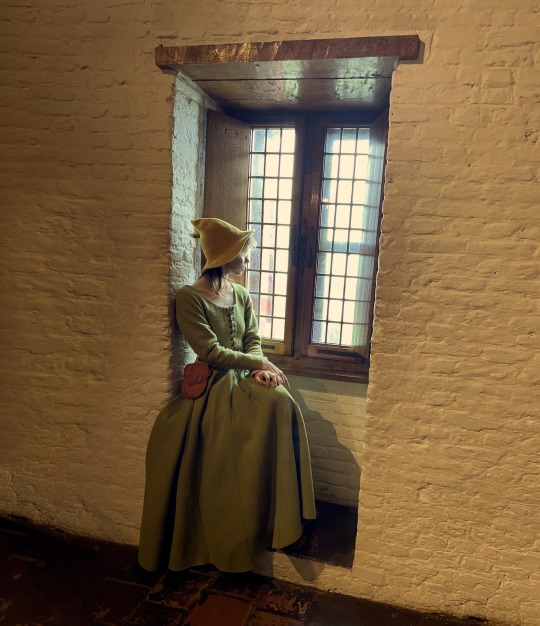
Wore my new kirtle to Muiderslot today!!
#historical reproduction#historical reenactment#history#medieval#medieval fashion#medieval reenactment#larp#medieval larp#kirtle#historical sewing#historical costuming#historical fashion#costumes
243 notes
·
View notes
Text

Bern face reveal? Never. Bern hand stitched 1880s corset reveal? Yes.
#it is DONE after SIX MONTHS IT IS DONEEE#will this be deleted later? yeah prolly.#historical costuming#historical reproduction#sewing#bern speaks
53 notes
·
View notes
Text
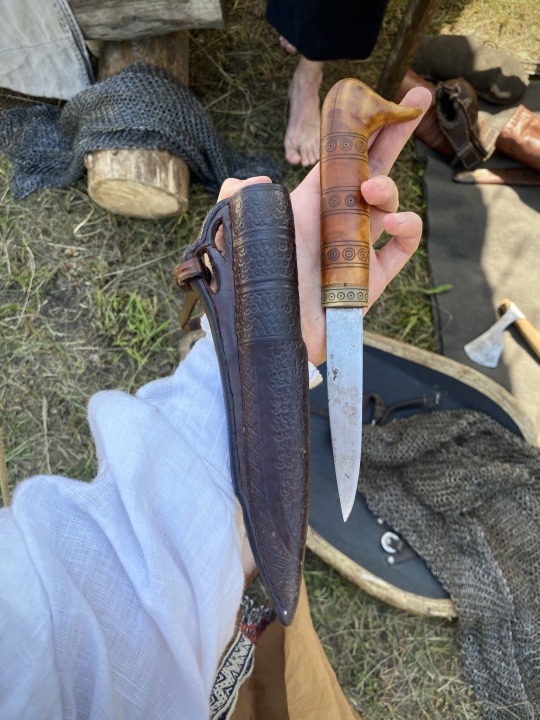
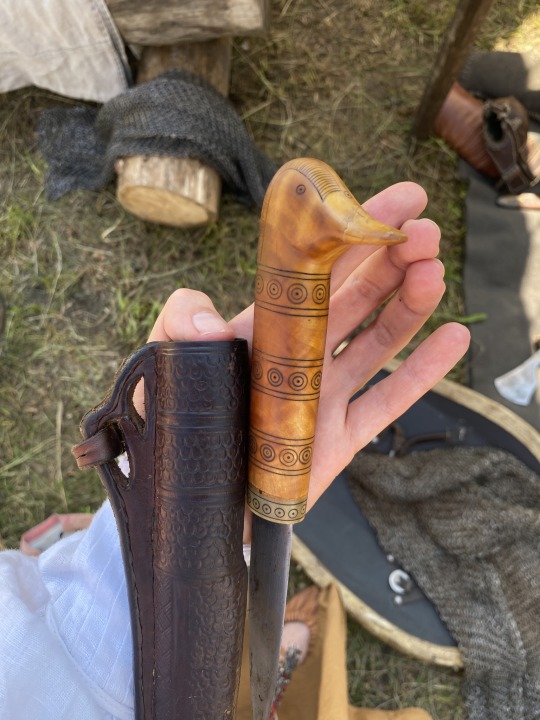
Duck dagger reproduction, iron age, based on archeological find in current Lithuania
#duck dagger!#DUCK DAGGER#i want one!#it was so pleasant to hold#dagger#historical weapon#historical reproduction#historic weapon#iron age#bronze age#viking#phone pics#baltic
81 notes
·
View notes
Text
someone could probably do a deep dive on Gender in CK3 which is not gonna be me; for me it's mostly just a culture shock as the *kind* of games I've been mostly playing have such a strong norm of portraying and coding in equality these days
#most of it is eminently historically reasonable#with the exception of Attractiveness modifiers arbitrarily ceasing to function for women at a much lower age than for men#when that mechanic is completely divorced from reproduction applies to all people of all ages and sexualities#you wanna tell me lesbians don't love a silver fox?
39 notes
·
View notes
Text
A long StEx headcanon: what are these trains?
I wrote this mostly at around 1 am while sick so there's a good chance it's nonsense, but yeah, they're like hermit crabs, sort of.
Trainfolk have two “bodies” so to speak - their humanoid forms and their “working” forms. Working forms look like trains in our world and exist separately from the humanoid forms when not in use. Humanoid forms are biomechincal in nature - from the outside they look mostly human but they have more mechanical innards (engine, for any train, is a term used akin to guts as a result). Generally they're human-size, with Engines tending to be a bit bigger (Rusty and Electra would be close to/over 7 feet tall).
When Trainfolk go to work, they meld into their working form - basically melting down into something like liquid metal and fusing to it (this happens very rapidly, within a second or two). They are still aware in this state, and Engines can operate independently without the need for a human driver (one is generally on call within the train in case of emergencies). Trainfolk can easily distinguish between an active working form and an “empty” train, as can more experienced human rail workers. Passengers generally cannot, if they're even aware of Trainfolk at all, but do tend to report a better atmosphere and experience when riding in an active Coach vs an empty one. Working forms are not necessarily permanent arrangements, but most Trainfolk tend to meld with the same Working form for long periods.
Engines can only meld into engines with a set fuel type, though this can be changed via physical conversion. Freight and Coaches are more flexible, and on rare occasions a freight may meld into a coach for their working form or vice versa.
Not all trains in a yard will be active Working forms, but Trainfolk strongly prefer to work exclusively with other Trainfolk - or if absolutely necessary, that any empty cars be at the back of the train. Nearly all coaches and freight will refuse to work with an empty Engine. Active working forms are usually preferred by human rail staff, as they have a reputation of being more reliable and even luckier than empty trains.
There are two ways new Trainfolk come into existence - birth and emergence. Birth is self-explanatory - a trainlet resulting from a relationship between two adult trains. Trainlets start out as infants and grow at roughly the same rate as human children. Designation as a Freight, Coach or Engine can be determined through testing before birth, though it's not 100% reliable.
Emergence occurs after a newly built train sits empty long enough - usually around 3 years, though sometimes it can happen more rapidly. This is especially the case for prototypes - the emergence of a trainlet is seen as an early sign of success. Emerged trainlets generally match the age of the train they emerge from. If not already in a yard, these trainlets are sent to be fostered at one as soon as possible. Emerged trainlets basically result from a melding in reverse, and tend to be more attached to their original working forms than born trains. Some trains choose this as a means of having a kid, but it's expensive and unreliable endeavor - not all trains left empty will result in a trainlet emergence.
Born trainlets tend to meld for the first time around their early teens. This can be done earlier, but there tends to be concern of youngsters getting permanently stuck if they try at too young an age. Some kids take to it more easily than others. A trainlet who does not meld into a train by the time they're in their mid-teens can lead to a host of issues, such as poor growth, and it drastically shortens lifespan.
A few physical changes come with the first meld (or are already present in emerged trainlets). The first is plating. Plating - and any underlayer that might come with it - serves as a protective layer when outside of their working form, and tends to match the livery and form of the working form (repainting the train would cause a change in the plating). The overall shape is more or less set at the first meld, even if the trainfolk eventually melds with a different working form. Plating is physically attached but can be removed; some trains prefer to wear human clothing when not working but plating is usually required for work and some activities like racing.
Melding can also change trainfolks cosmetically, altering thing like hair color, eye color, face and paint/makeup. In more extreme cases there are other physical changes (such as cryogenics like Hydra feeling cold to the touch). Damage to plating (or to a Trainfolk’s body in general) can reflect on working forms and vice versa (such as rust in cases like Rusty). They can also make more drastic changes to their humanoid forms when coming out of a meld, as long as they retain the same mass, though they'll usually make such changes gradually rather than all at once.
Both engines and fuel trucks have at least a small tank for their fuel as part of either their internal systems or in newer generations of trainfolk, in the backpack which is part of their plating. Provided they've been in their working form recently, Engines can go a long time without needing to eat, as can electrical components, though most choose to do se in both cases. Engines can also consume fuel in their humanoid form, especially when doing more intense physical activity like racing. Other Freight and Coaches need to eat more regularly.
In the event of death, Trainfolk will usually separate out from their working forms before expiring. Funerary practices for the humanoid form vary from yard to yard; the working form they melded with most recently may either be scrapped or refurbished depending on need. In the event of catastrophic failure, such as a crash, the Trainfolk may die while melded into their working form. As Trainfolk won't meld into a working form if another has died in it, they are always scrapped.
#starlight express#stex#stex headcanons#Headcanons#starlice expret#Tw birth#Tw death#stex wembley#This make no sense economically or historically but fuck it's alternate history#This is just how trains are as far as any humans in the world are concerned.#Tw reproduction
32 notes
·
View notes
Text
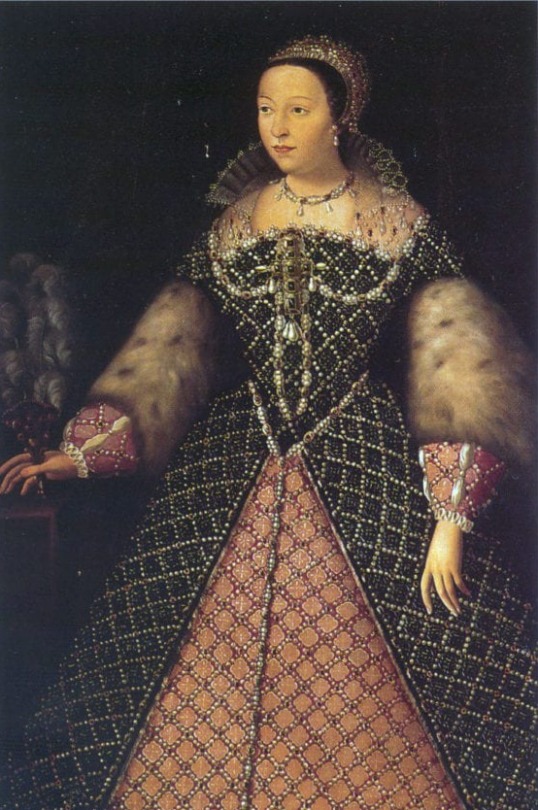
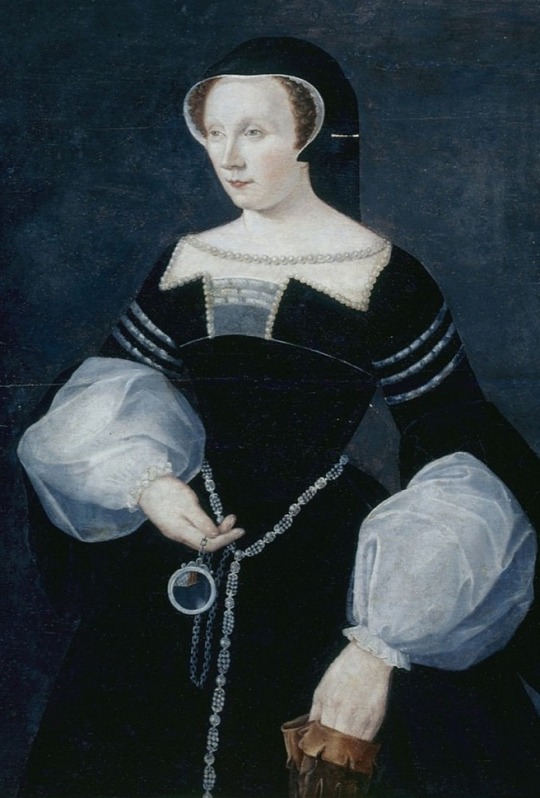
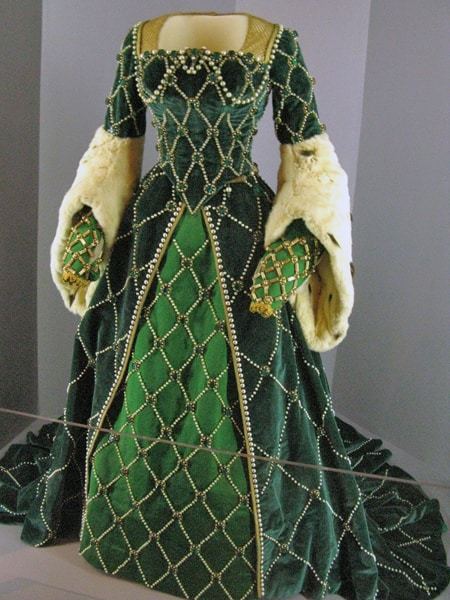
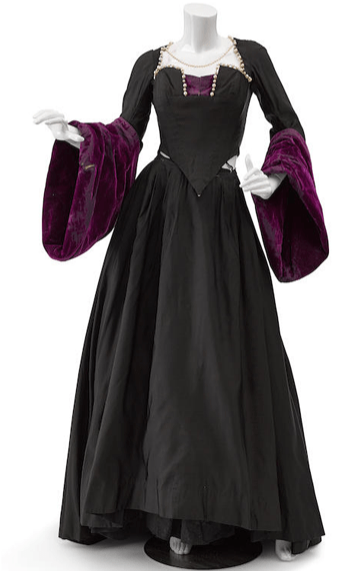
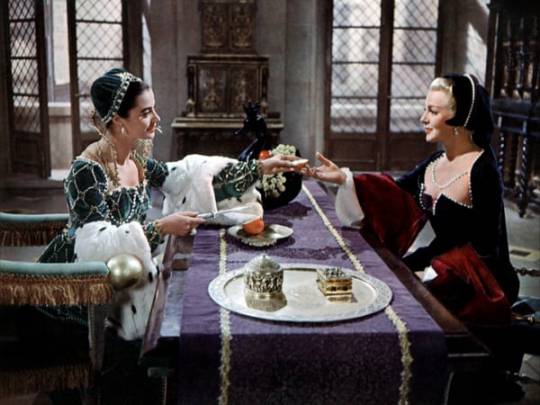
The gowns designed by Walter Plunkett for Diane (1956), with Marisa Pavan as Catherine de Medici and Lana Turner as Diane de Poitiers, alongside the historical portraits he based them on.
#I knew about the green dress but didn’t realized the other had historical basis as well#I thought the kind of boob-framing bodice was silly#like that one gown from Outlander#obv he has more boobage involved as opposed to the flat-fronted 16th century silhouette#but that is because Lana Turner has boobage the people want to see#fashion history#costume reproductions#16th century
74 notes
·
View notes
Text
This is insane!! I always love looking at corsets from this period because they have so much shape already built into them before the boning is even completed! If you have any process photos, I'd love to see them!
Sewing 1890s Day Dress in Doll Scale
I went slightly overboard with this second historical doll project. Here's my first one. The style is from around 1897 and more of a middle class style. As with my first doll outfit, I tried to stick to historical methods as much as possible, but the scale forced me to do some deviations. I hand-sew everything though sewing machine was already widely used, because in this scale it's easier to control the stitch, there's not that much to sew anyway and also I just really like hand-sewing. Here's all the items I made. As said, I went a little overboard. One thing that's missing is the corset cover, but the layers of fabric were creating enough bulk on the waist as is so I decided to not make one.

This time I decided to try repainting the face. I don't have any doll customization materials, so I used acrylics. After couple of attempts I got decent results. Acrylics can't make as smooth and delicate finish as pastels, pencils and gouache, which can be used on vinyl with basing sprays, and I'm not experienced with painting small details on 3D objects, so it's a bit smudged at points, especially with the other eye. I aimed for 1890s very neutral make up and the type of expression that was popular in fashion plates and other illustrations.
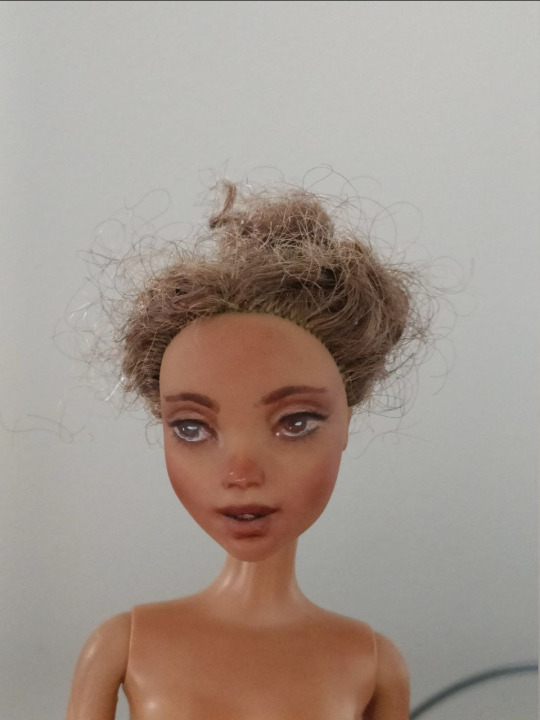
Undergarments
Combinations and stockings
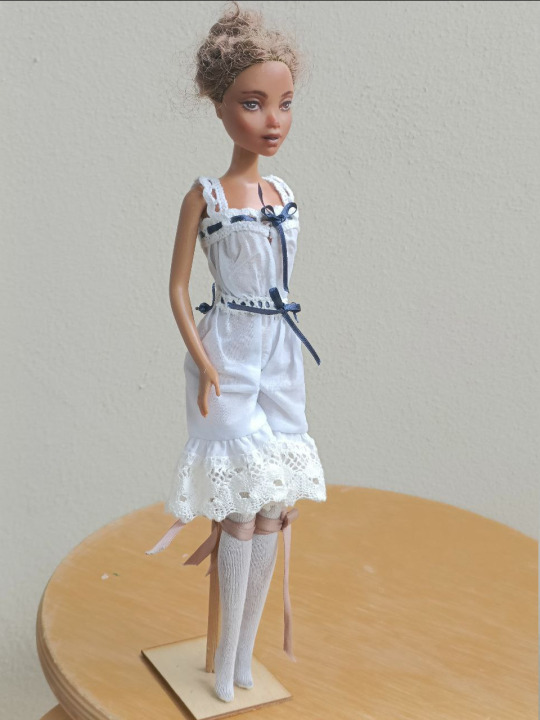
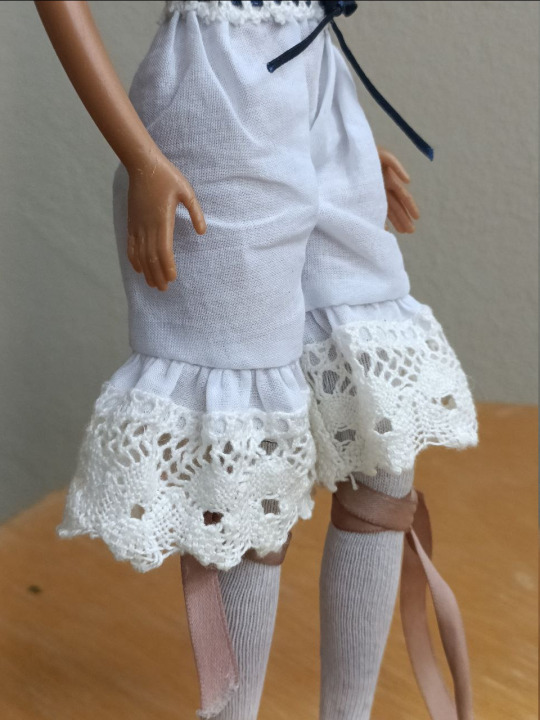
The combinations are split crotch as they were in the period. They are from thin cotton voile I have a lot of and is very appropriate. I didn't have really tiny enough lace for this, so it's kinda bulky, but I think it's okay enough. The stockings are cotton knit, which fits well. The garters are not actually necessary for this doll since her legs are rubbery.
Corset
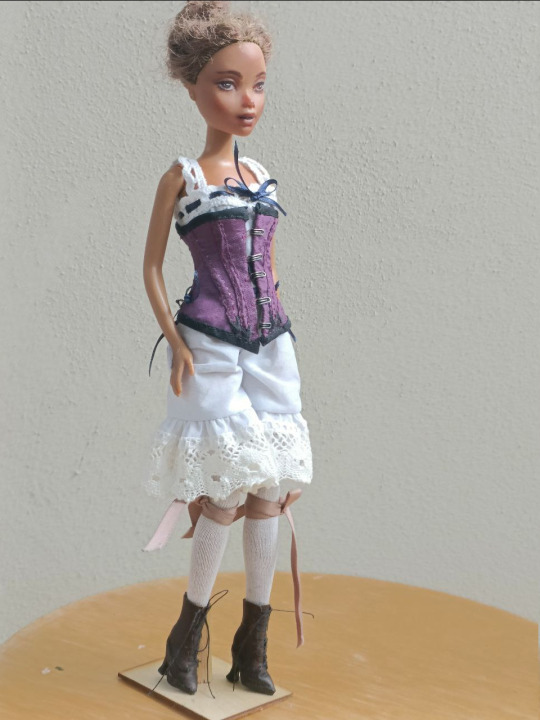
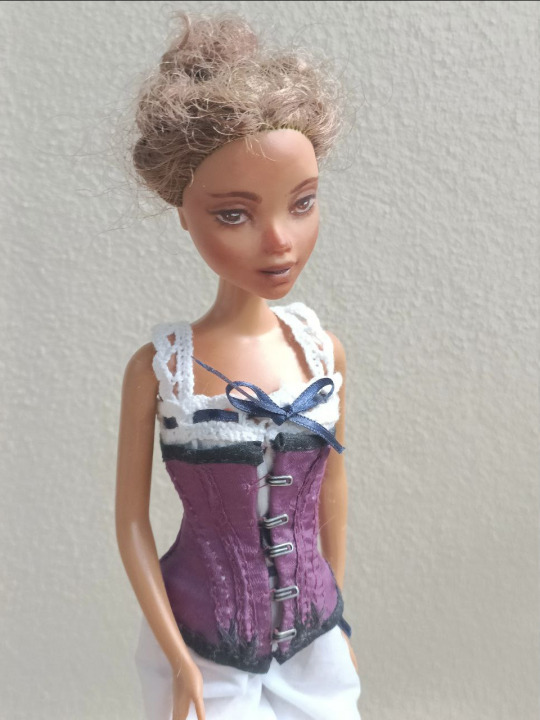
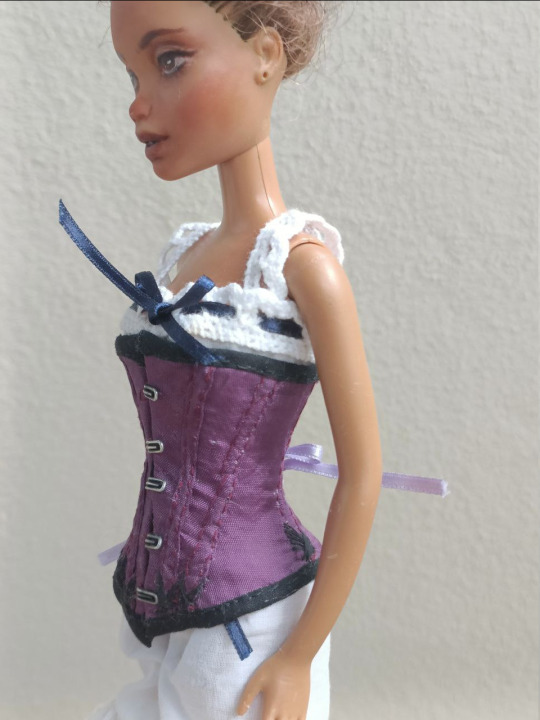
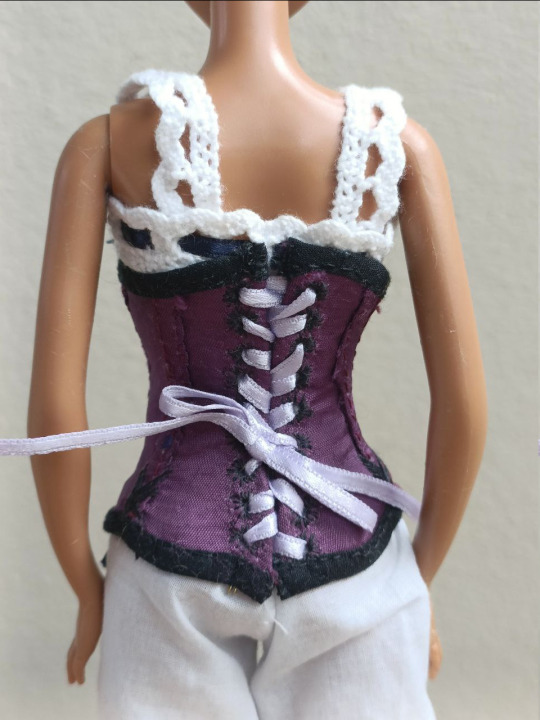
I made the corset from a firm-ish linen and satin rayon pretending to be silk as the fashion fabric. The stitching of the boning channels is not super neat, this fabric is very unforgiving, I didn't have exactly matching thread and the scale made it very difficult. I of course didn't have tiny busk, so I used small hooks, sewed thread loops for them and used narrow metal wire for the edges. I think it looks surprisingly right on the outside. I used the same wire as the boning to reinforce the lacing on the back. I didn't actually use boning elsewhere but the tightly packed linen edges in the boning channels kinda work like lighter boning. I think it keeps the shape pretty ways even with just that. I stitched cotton tape inside to shape the corset further. I also didn't have tiny metal eyelets so I hand-sewed the lacing holes.
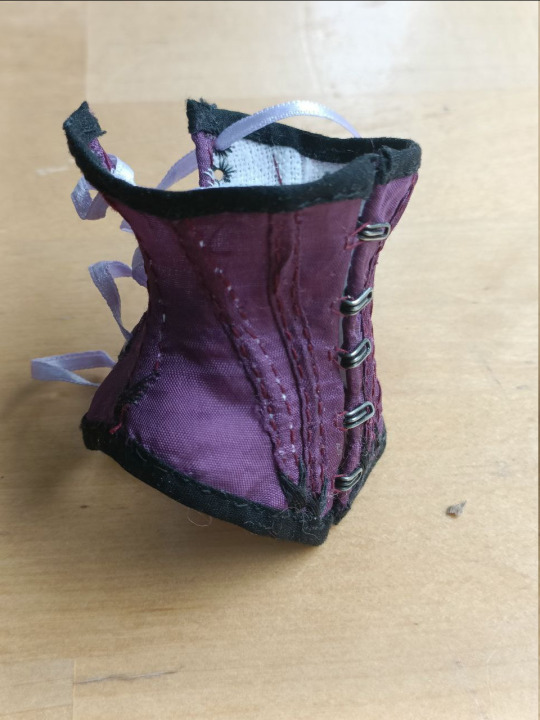
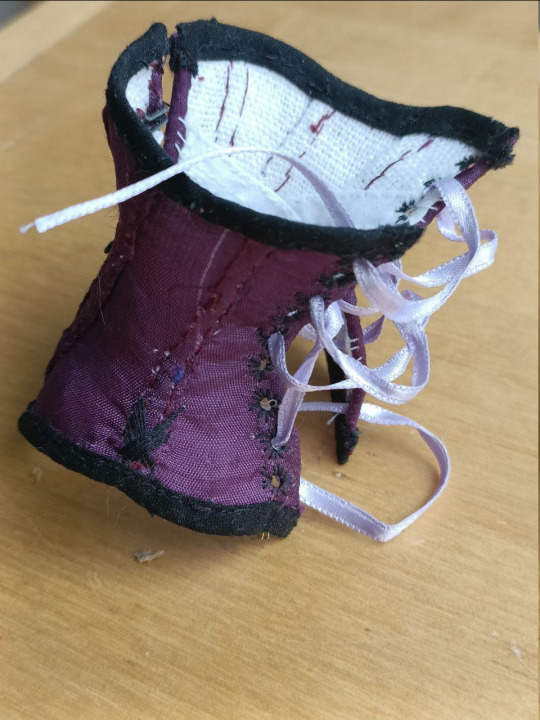
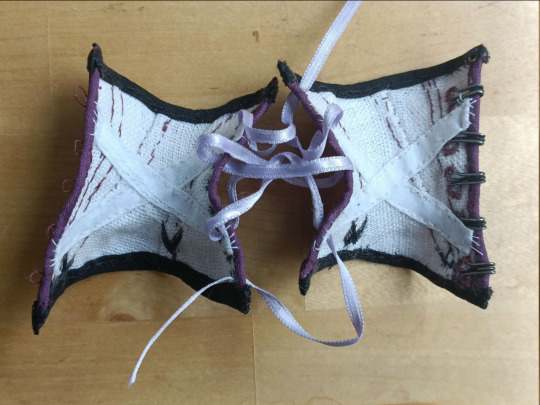
Bustle pad
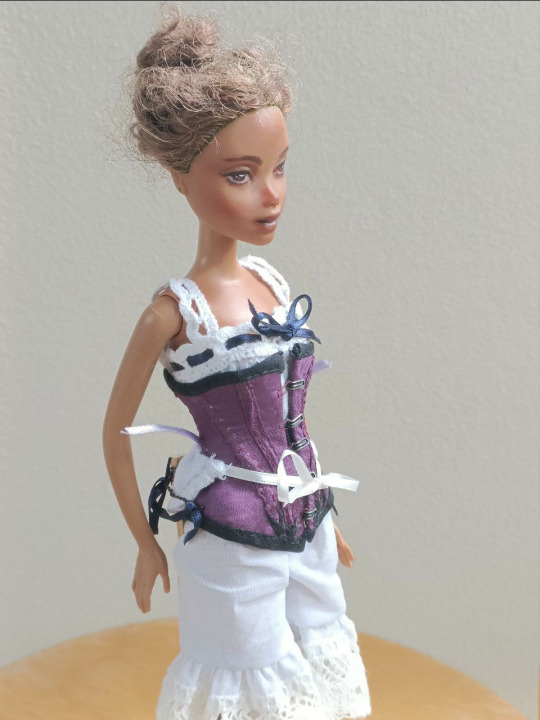
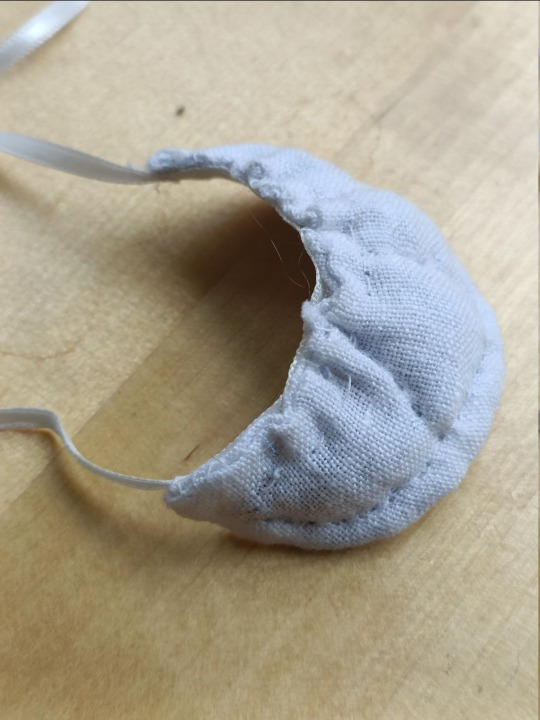
The bustle pad is from linen and stuffed with tiny cabbage.
Petticoat
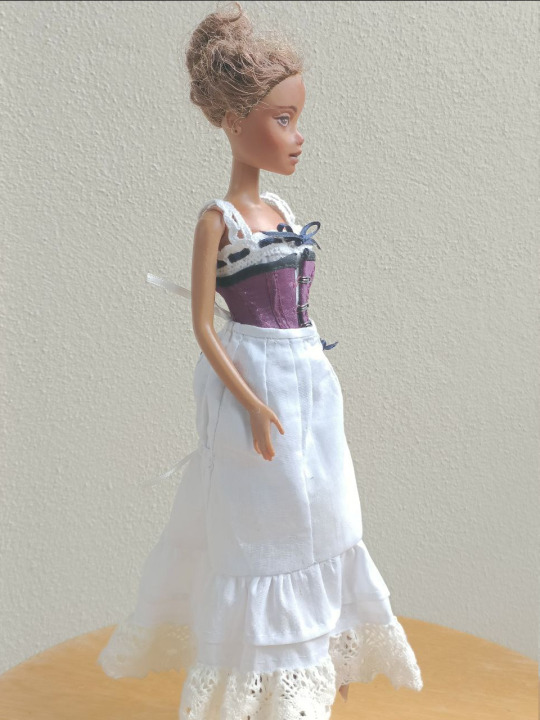
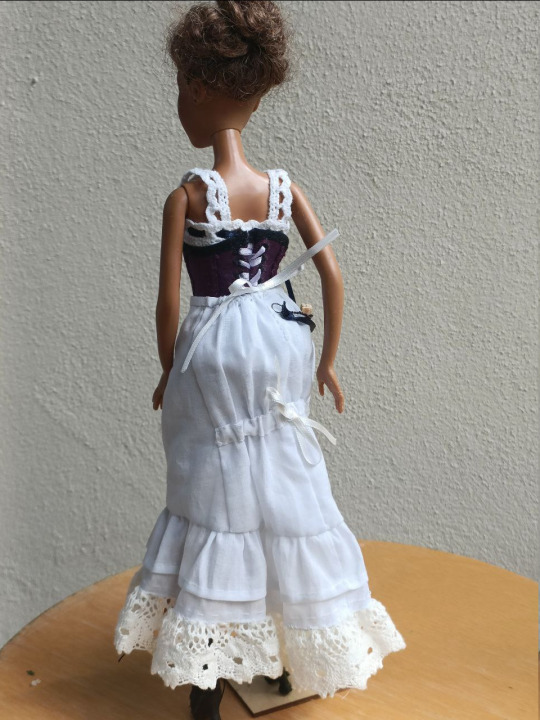
The petticoat is from the same cotton as the combinations.
Outer wear
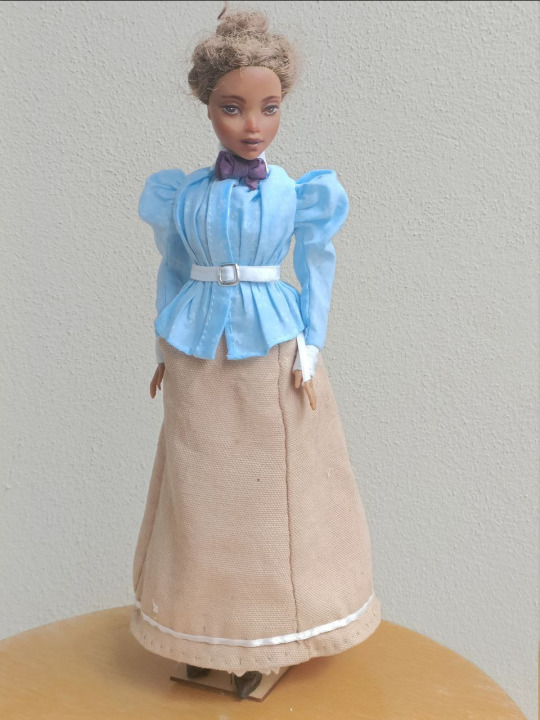
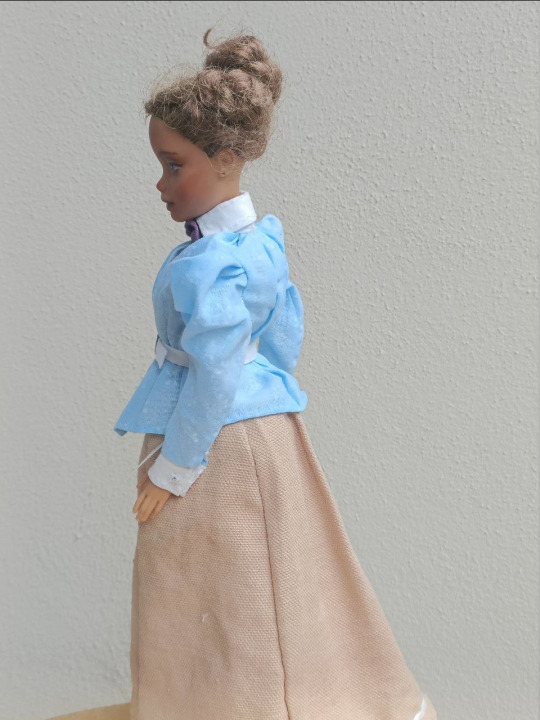
Skirt
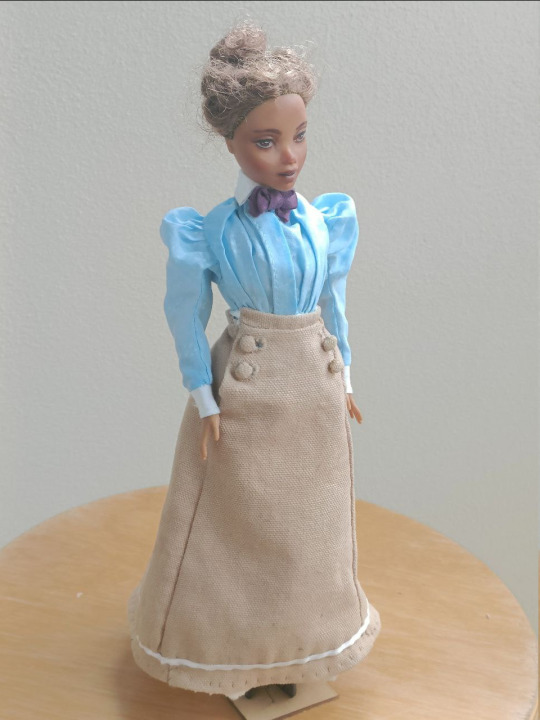
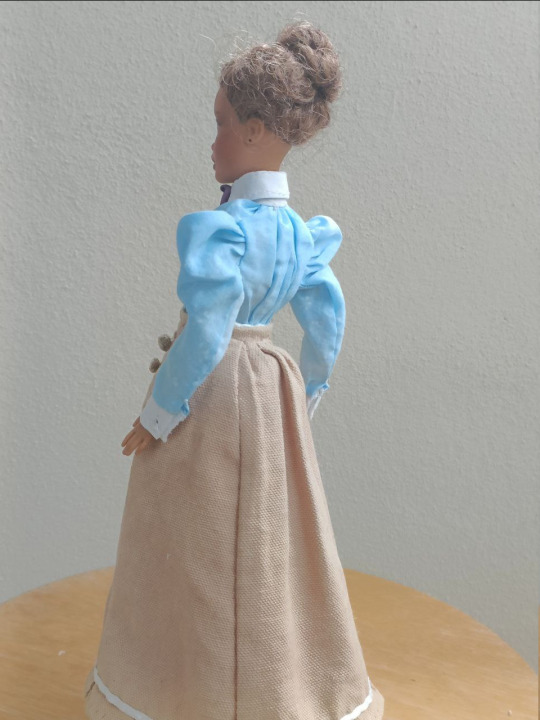
The fabric is cotton half-panama. It's pretty thin, but firm. I would have liked to use a woven wool, but I didn't have any that's thin enough to work in this scale. I think this cotton looks close enough in this scale to a wool with a tight weave, so I'm imagining it's that. My problem was that the cotton was white, but I wanted light brown. I wasn't going to buy any fabric for this, so I did the reasonable thing and dyed it with red onion peals (I've been doing natural dye experiments so this worked well for me).
Shirtwaist
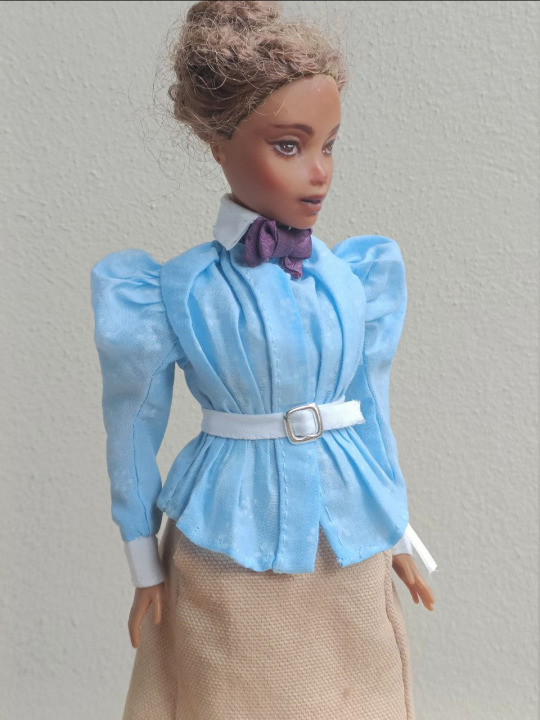
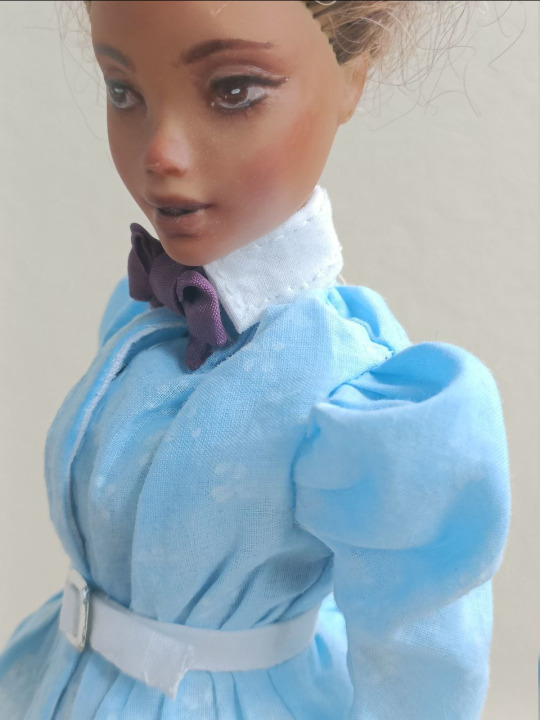
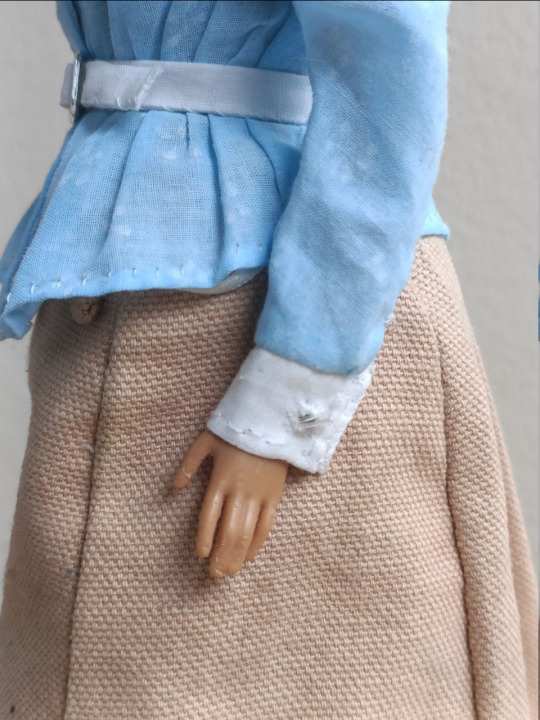
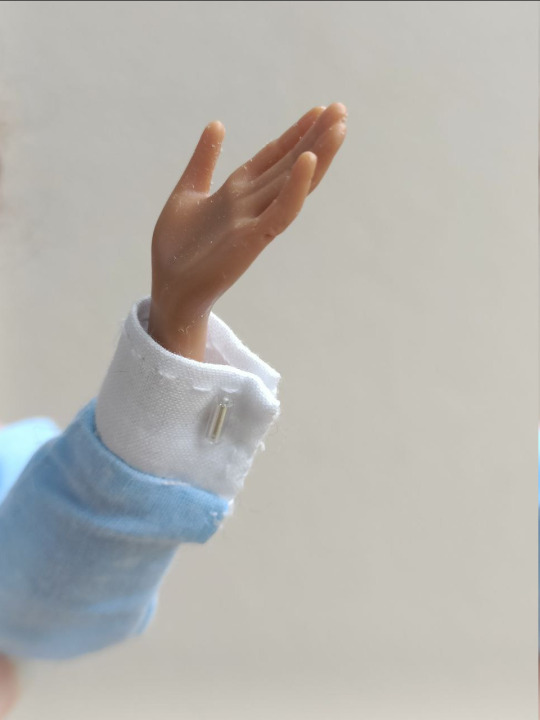
The shirtwaist is from the same cotton as the undergarments. Yes, I dyed it too. I didn't have thin enough cotton in a color that would fit with the skirt and the purple bow, so I dyed it light blue with fabric color. Since I already went the trouble of dyeing I decided I might as well make a small flower print to it since that was popular in the era. I didn't want it to jump out too much but the lighting makes it even less visible. I made it with a white fabric pen. The collar and cuffs are reinforced with linen. I also sewed small stick-like beads to the cuffs on both sides, so one acts as a button (I sewed a buttonhole too) and the other makes it look like they are cufflinks. The bow is from the same fabric as the corset and the belt is sewn from the same cotton as the shirtwaist. The buckle is from a barbie belt.
Waistcoat
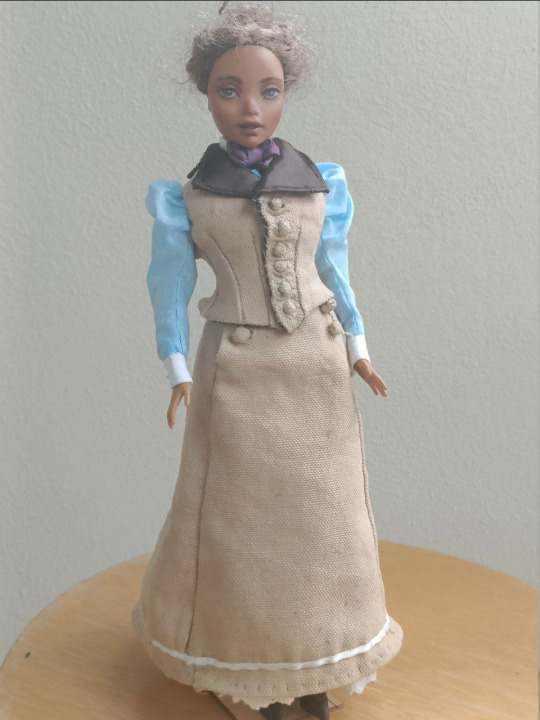
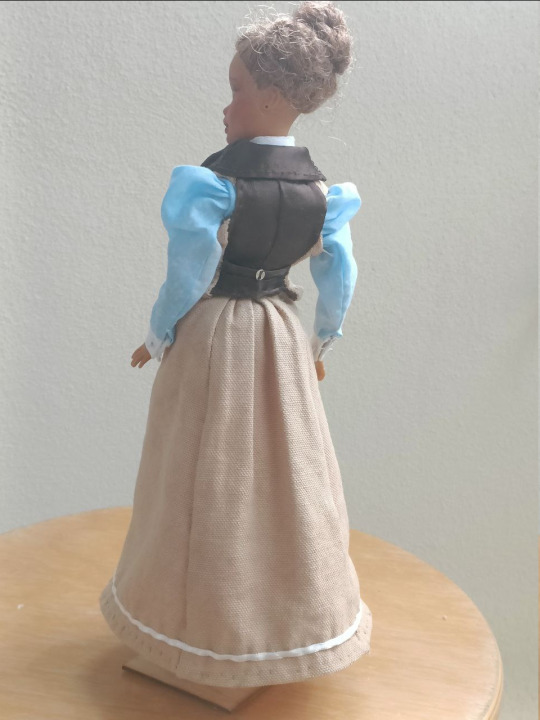
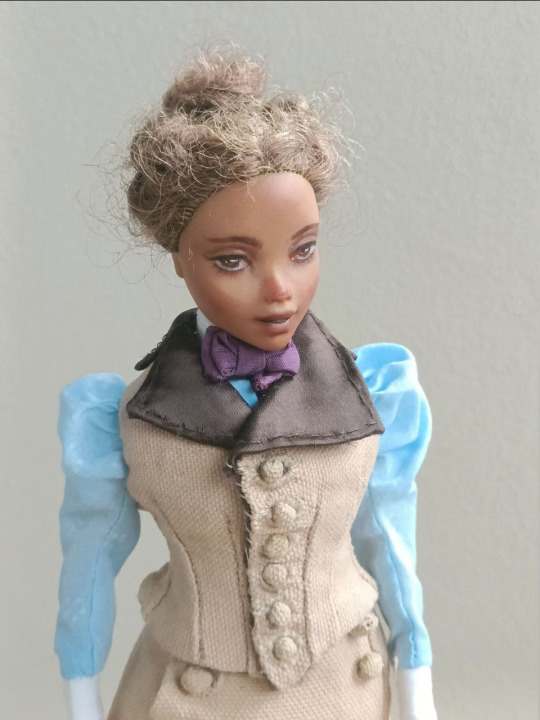
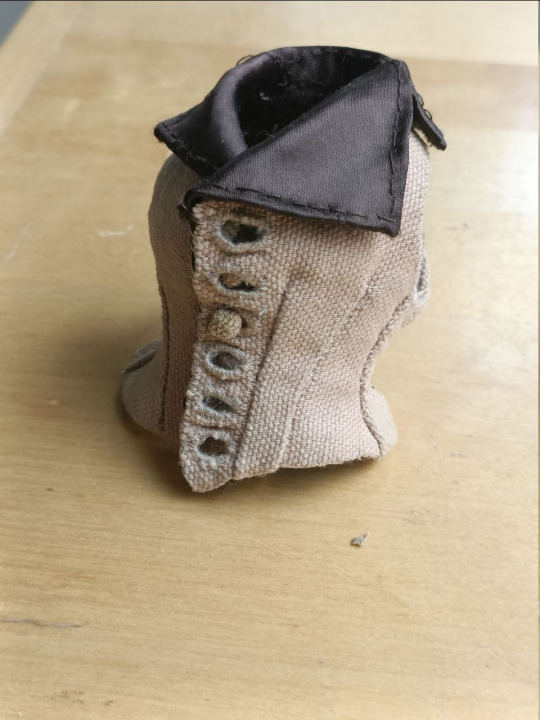
The waistcoat is from the same fabric as the skirt, thought the lapels and the back are from another satin rayon. I tailored the front panels and the lapels by stitching the linen interlining with tailor's stitches (I don't remember if that's the correct word in English) into shape. There is some wonkiness on one side of the hemline for some reason.
Boots
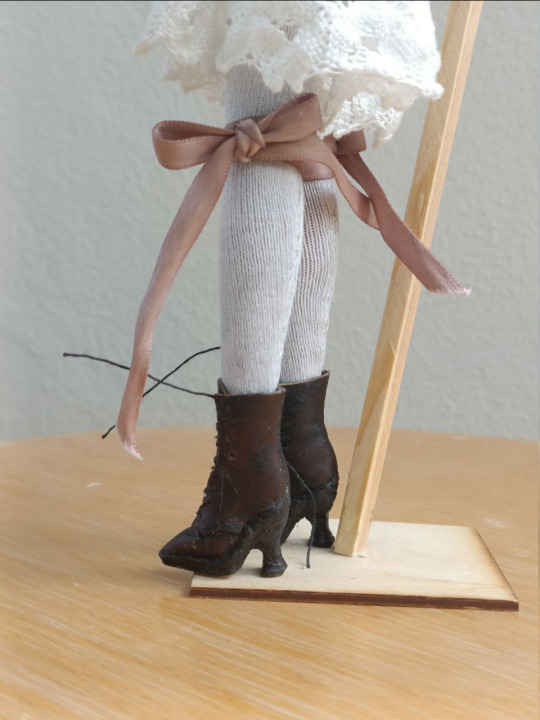
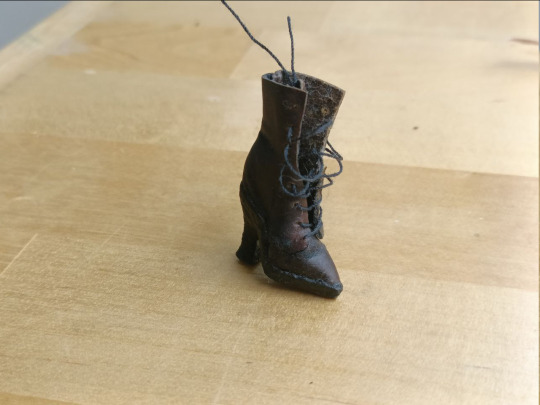
I made the slightly insane decision to make the shoes fully from leather, like they would have been in the period. I had an old broken leather wallet I had saved in case I needed some leather scarps. It has fairly thin leather, so it was workable here. It's light brown though, so I used black shoe polish to darken it. I wanted black or very dark brown shoes. I stacked the heels from glue and leather pieces and carved them into the right shape and sewed the shoe itself to leather shaped as the sole and glued it to the heeled and shaped sole. After I had shaped the shoes and the heels as much as I could I painted the heels black.
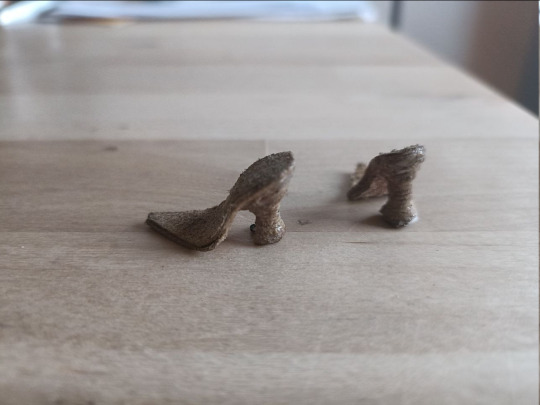
930 notes
·
View notes
Text

#art#painting#oil painting#handmade#oil on canvas#artwork#reproduction#art blog#art history#classical art#Frank Dicksee#Sir Frank Dicksee#historical painting#Middle Ages#medieval#religious art#Christian art#Christianity#British art#English art#19th century art#Victorian period#Victorian art#Tate Britain
31 notes
·
View notes
Text

2025 reads / storygraph
The Woods All Black
horror novella
a WWI nurse is sent to a rural Appalachian town by the Frontier Nursing Service to do vaccinations, and is met with distrust from the religious townsfolk who see him as a failed woman
he plans to weather it so he can help some young people who need it, but the townfolk get increasingly violent, and there seems to be something else lurking in the woods..
transmasc MC, t4t
#The Woods All Black#aroaessidhe 2025 reads#trans rights readathon#yeah this is pretty good#I liked the exploration of historical queer/trans identity a lot!#it’s kinda mainly historical fiction about queer/trans identity and reproductive justice with a slightly spooky atmosphere#until right at the end where things get violent and monsterfucky. which honestly I think I would have found quite jarring#if I went in not knowing about it because it really is quite slowbuilding until the sudden escalation at the end#(in fact until the last 10% i was like i’m sure i saw someone say there was monsterfucking but I’ve seen nothing of the sort??)#but sure. why the fuck not. good for them.#glad i was wearing sunglasses and a mask while walking down the street listening to that because i’m sure there was a face journey#the 30/18 age gap combined with him constantly being referred to as young and a boy was….a little uncomfy?#I feel like I unconsciously aged him up a bit; bc what was the reason?#It is of course unusual circumstances and probably not abnormal in a historical context; i’m not like; pearl-clutching over it; just idk#needless to say there’s a lot of people bringing this up in the reviews though#that + the pacing at the end I’m a bit iffy about but otherwise overall i really enjoyed it
18 notes
·
View notes
Text
Old followers will remember when one of my short vent post about hating the euphemistic way textiles that are essentially plastic are marketed and described, which included amongst others 'vegan leather', broke containment. And since then I have seen a lot of posts on tumblr by vegans dismissing people who have made such posts, stating that people only pretend to care about plastic pollution and its environmental impacts to shit on vegans. And I'm sure this criticism is fair for a lot of people who reblog the posts (I live in the world, I have to face how much people.... seemingly do not care), but why do they think that is the case for the OPs? Why would they be that pissed off if they didn't care about reducing plastic pollution in the first place???
My own post was the culmination of the fact that I had been redefining my relationship to plastic and waste more generally for years, and faced extreme frustration realising how inescapable plastic can be, how many names it can be found under, and how much switching to plastic has affected the quality and longevity of objects that have long been part of human life. As part of that process, I had decided to start learning how to mend my clothes with my late grandmother's sewing stash, which then led to me learning how to sew in an effort to recycle old clothes knowing they would otherwise end up in the landfill even if they were brought to a charity shop. Being self-taught, I had turned to youtube tutorials and videos by sewists.... but even then plastic was everywhere under these euphemism. Genuinely the thing that broke the camel's back wrt to that post was hearing 'synthetic whale bone' too many time while I was in a bad mood, where I ended up bitchily saying out loud 'fucking just plastic jesus christ'. After that I just listed other examples as part of the vent I thought would stay on this blog. I do hate the term 'vegan leather' but that has to do with the marketing aspect and the sort of 'green-washing' it implies, not its ties to people who are vegan. Honestly in comparison I dislike faux-fur more, because it looks like it was brought into existence for the sole purpose of shedding plastic everywhere.
#needed to get my frustration out lmao#i deleted the post so as to not see the notifications so I am enjoying ignoring what discourse might have been had#in the notes#also about the synthetic whale bone: as fare as I know there is at least metal options#and if you are into historical reproductions you can use other organic materials that people used before whale bones or when they couldn't#afford it#IN MY OPINION
17 notes
·
View notes
Text
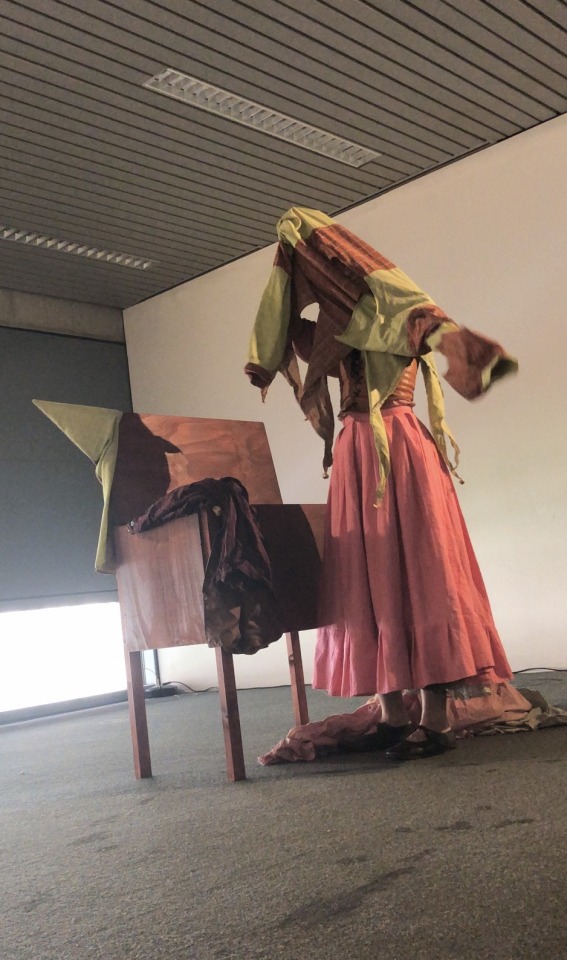
De verkleedkist
#art#contemporary art#fairytale#sprookje#art student#historical costuming#art experiment#visual art#fine art#historical#historical reproduction#medieval#late medieval#medieval chest#uitzet#costumes#costume chest
1 note
·
View note
Text
Full body workout ideas: Boning 18th century stays
6 notes
·
View notes
Text
“During long periods of history, the mode of human sense perception changes with humanity’s entire mode of existence. The manner in which human sense perception is organized, the medium in which it is accomplished, is determined not only by nature but by historical circumstances as well.”
—Walter Benjamin, The Work of Art in the Age of Mechanical Reproduction (1936)
#walter benjamin#historical materialism#marxist critique#art#The Work of Art in the Age of Mechanical Reproduction
11 notes
·
View notes
Text

Happy 186th birthday to this 1838 fashion plate from the Petit Courrier des Dames! This is the first design from my set of A4 reproduction fashion plates, of which I will be revealing at least one a day for the next couple of weeks or so while I wait for them to arrive from the printer.
Transcription of the original french description:
"Chapeau en paille de riz des Maisons de Madame Dasse, rue Richelieu, 38. Robe foulard chinné, façon de Madame Camille, rue Choiseul, 15. Redingote en foulard broché, façon de Madame Dufayelle, rue n. du Luxembourg, 4. Châle Abboussara, des Maisons de la Caravane, rue Richelieu."
#fashion plate#1830s#reproduction fashion plate#Petit Courrier des Dames#1830s fashion plate#historical fashion
23 notes
·
View notes
Text
if I were a printer & bookbinder I would simply recreate first editions of western classics
#I think we can all agree that 99% of the time the first edition was WAY PRETTIER than any of the following editions#and much as there is historical value to an actual first edition#I would love to spend a little extra on a copy that LOOKS like a first edition but isn't gonna set me back $860#x#it's like The Noble Collection; you pay a decent price for a reproduction of a film prop without buying the actual prop at auction
14 notes
·
View notes
Text
always reading about and thinking about arthur as usual . anyways , in this book it says someone calculated that arthur’s kill tally , even in an honorable run , must have been somewhere around 900 people .
sb : how many people have you killed ? arthur : nine . sb : oh thank god . that’s not as bad as i thought haha , i thought it was gon’ be 90 or somethin big . arthur : hundred . sb : NINE HUNDRED ????
#( ;; sry i have not wished to write big things for him lately. )#( ;; i'm still yapping everyone's ear off on d.isco daily. )#( ;; this book is giving a lot of historical context. )#( ;; tmi but i'm dealing w a reproductive system issue irl so i'm taking it easy. )#╰ ゜out of character. * kat's blabbering about cowboys again.
9 notes
·
View notes